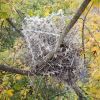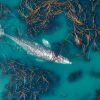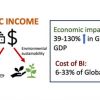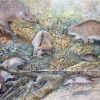Earth & Nature: 1 of 10
-
1.
 +37
+37Crows and Magpies Snatch Anti-Bird Spikes to Build Their Nests
Birds in Europe are prying up the metal barbs, meant to repel them from roosting on buildings, and using the devices as nesting material
-
2.
 +26
+26Gobsmacking Study Finds Life on Earth Emerged 4.2 Billion Years Ago
Once upon a time, Earth was barren.
-
3.
 +32
+32Forever Chemicals Seep Through Human Skin, Alarming Study Confirms
An inescapable form of human pollution is seeping into our bodies in ways we never fully realized.
-
4.
 +28
+28These Gray Whales Are Shrinking, and Scientists Aren’t Sure Why
Gray whales in a small group that sticks close to the shores of the Pacific Northwest appear to be shrinking—and shockingly quickly
-
5.
 +32
+32Hermaphroditism: Nature Isn't Binary
-
6.
 +27
+27Rocket company develops massive catapult to launch satellites into space without using jet fuel: '10,000 times the force of Earth's gravity'
SpinLaunch is developing a large rotating arm that uses kinetic energy to fling 440-pound satellites into low orbit.
-
7.
 +21
+21Sexual Reproduction Is Already Weird, but These Animals Make It Weirder! Much Weirder...
-
8.
 +27
+27Should We Kill Some Wild Creatures to Protect Others?
Two new books take up the ethics of killing some animals to protect others. By Elizabeth Kolbert
-
9.
 +26
+26‘My 50-year puzzle of the East Lothian hill where ancient fires burned’
Leading archaeologist Professor Ian Ralston has rewritten the story of Doon Hill in East Lothian, with his long career set to be honoured
-
10.
 +25
+25Basic income can double global GDP while reducing carbon emissions
Giving a regular cash payment to the entire world population has the potential to increase global gross domestic product (GDP) by 130%, according to a new analysis published June 7 in the journal Cell Reports Sustainability. Researchers suggest that charging carbon emitters with an emission tax could help fund such basic income program while reducing environmental degradation.
-
11.
 +21
+21California wants to seize oil majors’ profits as climate damages
California amended a lawsuit it filed against five western oil majors last year, hoping to seize “ill-gotten” gains from climate deception and cover-up.
-
12.
 +32
+32Bizarre armor from Mycenaean Greece turns out to have been effective
People suspected the Dendra armor was ceremonial, but new tests show its utility.
-
13.
 +23
+23Australian scientists identify ‘Age of Monotremes’
Evidence of the oldest known platypus and a new species ‘echidnapus’.
-
14.
 +24
+24Cats Kill Billions Of Birds Every Year. It’s Time For That To Stop.
-
15.
 +32
+32Egypt is building a $1-billion mega-museum. Will it bring Egyptology home?
For 100 years, Egypt’s scientists have watched as their nation’s story was largely told by institutions from Europe and the United States. Can a stunning new museum change that narrative?
-
16.
 +30
+30What’s better for the climate: A paper book, or an e-reader?
Books take a lot of resources to make. Digital readers do, too. What's the more sustainable option? The answer isn't straightforward.
-
17.
 +21
+21Svante Arrhenius, the Man Who Foresaw Climate Change
Svante Arrhenius, awarded with the Nobel prize, discovered at the end of the 19th century that CO2 emissions caused an increase in the planet's temperature.
-
18.
 +28
+28The 5 Dinosaurs That DIDNT Go Extinct!
-
19.
 +24
+24Oil and Gas Companies Are Trying to Rig the Marketplace
Fossil fuel interests are spreading misinformation that renewable energy is harmful, unreliable and worse for consumers.
-
20.
 +23
+23Scent of the afterlife? Scientists re-create recipe for Egyptian mummification balm
Beeswax, plant oils, animal fats, bitumen, coniferous resins, coumarin, and benzoic acid.




















